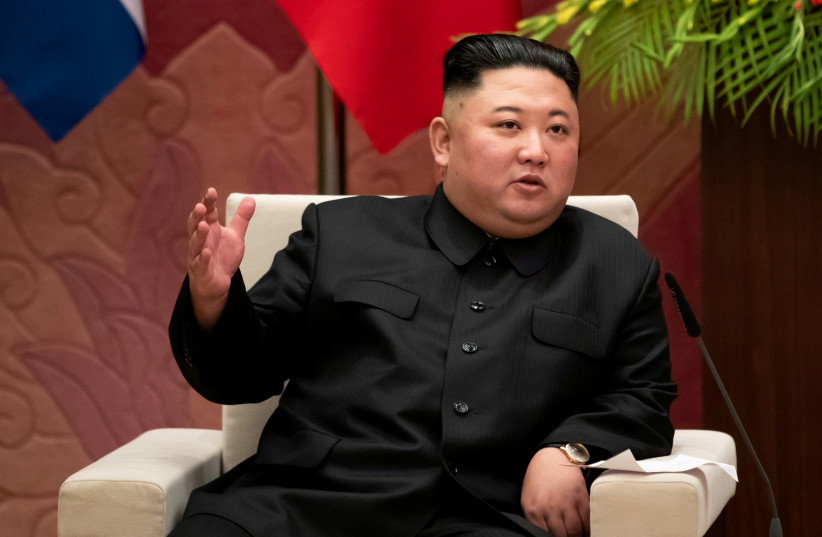With all of the focus on Iran’s nuclear-weapons program, it is far from the only threat for a nuclear exchange, and there are many other countries that are more dangerous candidates for leading to worldwide nuclear Armageddon.
That is only one reason why Monday’s statement by the five powers – the US, Russia, China, England and France – against nuclear weapons is a nice thought. But it could be somewhat empty.
First, neither Iran nor these countries are the most likely candidates to use nuclear weapons in the near future, with North Korea and Pakistan often being the greatest concerns.
Tehran is weeks away from sufficient uranium and then trying to spend six months to two years to solve other weaponization issues to get to its first nuclear weapon.
Pyongyang is estimated to already have 40-50 nuclear weapons.

North Korean leader Kim Jong Un is considered fanatical, unstable and unpredictable if his country were to fall into what he perceived as a desperate economic or security situation – even if a rational person might not view the situation as desperate.
Experts have theorized that the best way to keep Kim from using his country’s nuclear weapons has been a mix of offering diplomatic benefits for some kind of future disarmament or peace-encouraging deal, along with making it clear that if he started a major war, his country would lose worse.
Pakistan is another wild card. In theory, its approximate 165 nuclear weapons are kept under careful and stable lock and key by the military and intelligence apparatus. But some leaders of Pakistan have had radical ideologies and have aligned themselves with jihadist terrorist groups.
So no one really knows whether Pakistan can be counted on to think rationally if the wrong leader happened to be in power at the wrong time, such as during some kind of escalation with India, with which it has regular on-and-off conflicts over border issues.
The US, England, France, India and Israel (which, according to foreign sources, has 80-200 nuclear weapons) are not expected to act irresponsibly.
Generally, Russia and China are thought of as more responsible nuclear powers, given that Russia has had nuclear weapons since 1949 and China since 1962, and neither has used them despite many conflicts along the way.
But is that trust changing?
For an extended period before and after the fall of the USSR, Washington and Moscow cooperatively worked to reduce their nuclear missile arsenals, falling to 1,458 (Russia) and 1,389 (US) strategically deployed (there are thousands more on both sides that are not deployed).
Yet, in recent years, Russian President Vladimir Putin has escalated the development of smaller “tactical” nuclear weapons, which do not violate the NEW START treaty that the two countries last year extended until at least 2026.
Meanwhile, Beijing still has only 350 nuclear weapons. But like Putin, it is said to be working hard on developing additional, more modern and harder-to-defend-against nuclear missiles. Hypersonic weapons and additional submarine-based nuclear weapons are only a few other new areas where the US could find itself outflanked.
Might Putin consider using a tactical nuclear weapon against Ukraine if an initial conventional invasion was not going as planned, or might he threaten using one against NATO if it dared to interfere?
Could the same question be applicable to Chinese President Xi Jinping if he tried to invade Taiwan or if the US or some other ally tried to come to the aid of Taipei?
In fact, it is the mix of the growing threats from Russia and China that led the Trump administration to forgo extending other nonproliferation treaties, and it might have even dropped NEW START had Joe Biden not beaten Trump for the US presidency.
To date, the Biden administration has not really arrived at what its new nuclear strategy should be in dealing with the rising threat from Putin and Jinping.
Portions of the US Democratic Party believe that Moscow and Beijing will restrain themselves if Washington leads by example by not modernizing its nuclear weapons and continuing to reduce its nuclear stockpiles even without an exact offset by the other side.
They say even a significantly reduced US nuclear arsenal would be more than enough to annihilate any adversary.
Others believe this is naive: that nuclear deterrence is about momentum and not just absolute numbers; that a new framework is needed, which includes China, lest the US reduce its arsenal while only getting a reduction from Russia.
All of this is further complicated by Putin’s desire to use the nuclear issue as a bargaining chip to roll American/NATO influence back from Ukraine and portions of the former USSR countries in Asia and Warsaw Pact countries in Eastern Europe.
And after all of that, if Iran does get to the nuclear threshold, virtually all predictions are that Saudi Arabia, Egypt and maybe others will also seek nuclear weapons, dramatically expanding the nuclear club.
The more members there are in the club, especially in the volatile Middle East, the greater chance that some rogue general, coup leader or jihadist gets their hands on at least a “dirty” nuclear bomb and wreaks havoc against Israel or some Western country.
This makes for a scary 2022 no matter what the five powers said on Monday and no matter what happens in the Iran nuclear talks. And it looks even scarier if the talks do not block Tehran’s path to the bomb in the coming months.
